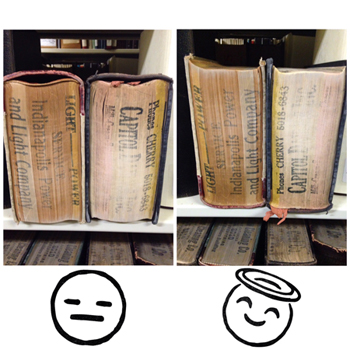Preservation for Free!
Preserving collections, whether they are your small collection of family photos and documents or a large library, can seem both daunting and potentially expensive. Yes, hiring a Conservator, purchasing ‘archival’ quality preservation housing materials (like boxes, envelopes, sleeves, and folders), and acquiring all of the equipment necessary for an on-site Conservation Lab are all major investments, but there are also small things everyone can do *for free* to prolong the life of their materials.
Handling
Improper handling of books is a very common cause for damage. Just this week, The Metropolitan Museum of Art published an article on their blog about The Fragility of Headcaps and the Safe Handling of Books. Headcap damage is very common and easily avoidable with good habits. Watch me remove this book the right way:
Also, avoid stacking books too high, carrying too many at once, or attempting to lift a book that is too heavy for your ability, as a lot of damage can occur from a book falling to a floor.
Proper shelving
This is pretty self-explanatory:
While you might think it looks nice or perhaps you were paging books in a hurry, leaning books cause a lot of damage. When the textblock is skewed in this way it will lose its integrity and possibly break into sections. The case (the covers and spine of the book) is also likely to incur damage at the joints, especially if the covering material is an older, fragile cloth or leather.
If you need to store a book on its side, never place the book with the fore-edge down. It is very tempting to do, because then the call number and/or title is more visible, but the weight of the textblock will eventually pull the book away from its covers and/or break or warp the textblock entirely. So even though it is more inconvenient, always store them spine-side downward (or plan to repair your book much sooner and more often).
In addition to the above, always remember to:
- Be considerate to older bindings – Don’t force open a tight binding, and make sure if a book is fragile you give it some extra support to open it safely.
- Always handle with clean hands
- Only write in books if necessary, and only use pencil.
- Do not attempt “treatments” you find online – Sure, there’s a Youtube video showing you how to humidify stuff in a trash can. It looks so easy! But then there’s also this guy:
(Luckily it was a joke, but I’ve certainly seen my fair share of scary “treatments” people think are great that are actually very harmful!)
This blog post was written by Rebecca Shindel, Conservator, Indiana State Library. For more information, contact the Indiana State Library at 317-232-3675 or “Ask-A-Librarian” at http://www.in.gov/library/ask.htm.



